This post may contain affiliate links, from which we earn an income. Click here to read our affiliate policy.
Find out how to travel in the EU as the spouse of an EU citizen
In our 5+ years of full-time travelling in the EU, this is one of the questions we get asked the most!
Can I disregard the Schengen rules because one of us is an EU citizen? Yes, you can. In this guide, we’ll share all the information we have gathered about family members travelling with an EU citizen, from detailed research and discussions with the EU themselves, plus our tips to help you negotiate stress-free border crossings.
We know it’s achievable because we have travelled restriction free since Brexit, using Phil’s Irish passport to allow us to stay in Europe without worrying about the 90 in 180-day rule. Let us show you how…
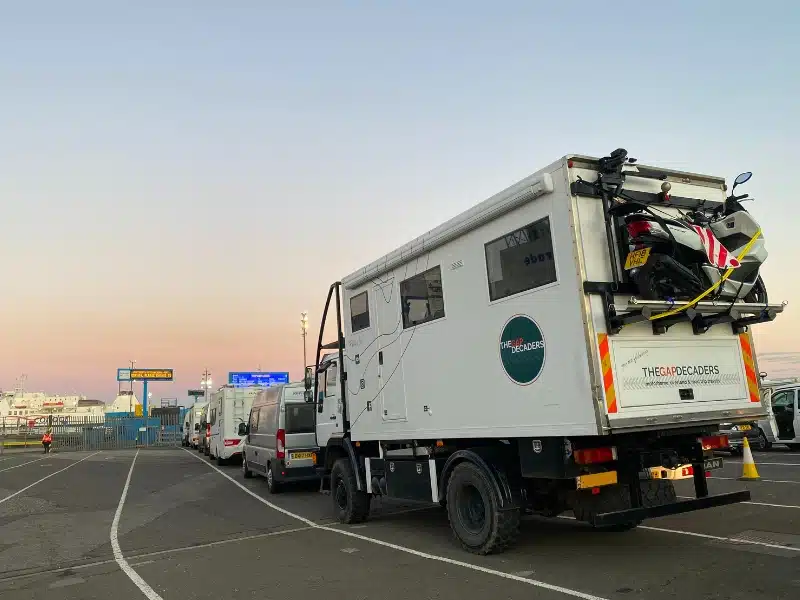
What is the Schengen?
No doubt you’re here because you’re trying to find a way of staying in the Schengen Area past the restrictive 90 days you’re allowed to spend in every rolling 180 days.
If you don’t already know, the Schengen Area is a zone where 29 European countries, through the Schengen Agreement, abolished their internal borders and allowed the free and unrestricted movement of people.
The UK did not sign up for the Schengen Agreement in 1985, but through its membership of the European Union, UK citizens enjoyed the right to freedom of movement throughout the European Union until Brexit.
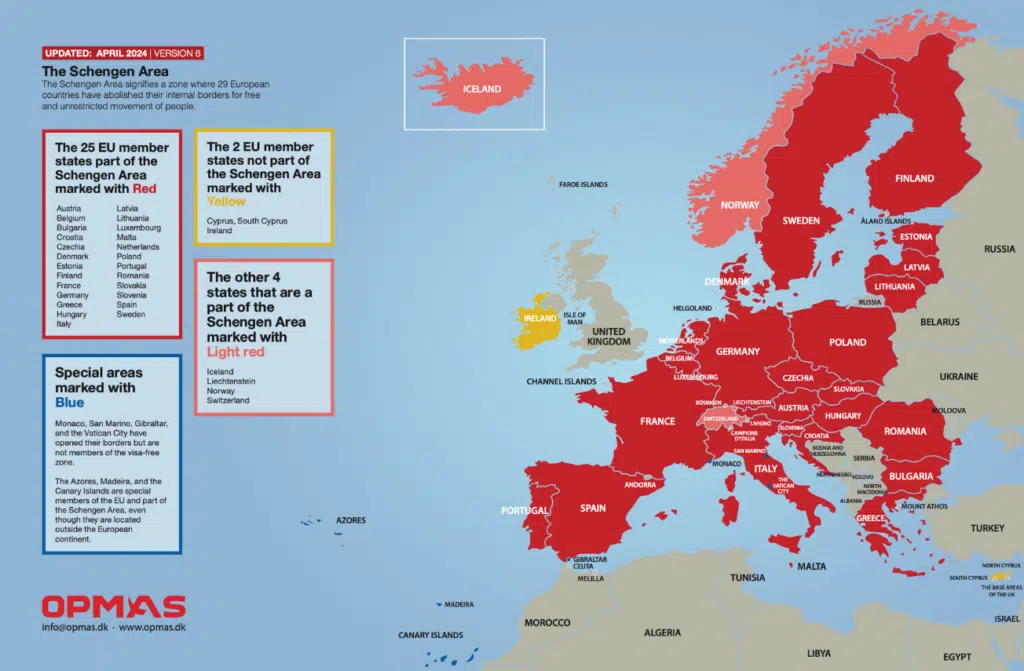
How does the Schengen affect travel in Europe as a UK citizen?
Many of us have become used to spending the entire winter in southern Europe, chasing the sun, living in a motorhome or working as digital nomads. A European trip of six months or more was not unusual, with some choosing to take a gap year or travel permanently in the EU.
But from 1st January 2021, UK citizens have only been able to stay for 90 days in every 180 days in the Schengen Area, unless you make a complex application for a non-lucrative visa, which still restricts movement outside of the country of issue.
RELATED POST: Motorhoming in Europe After Brexit: All You Need to Know!
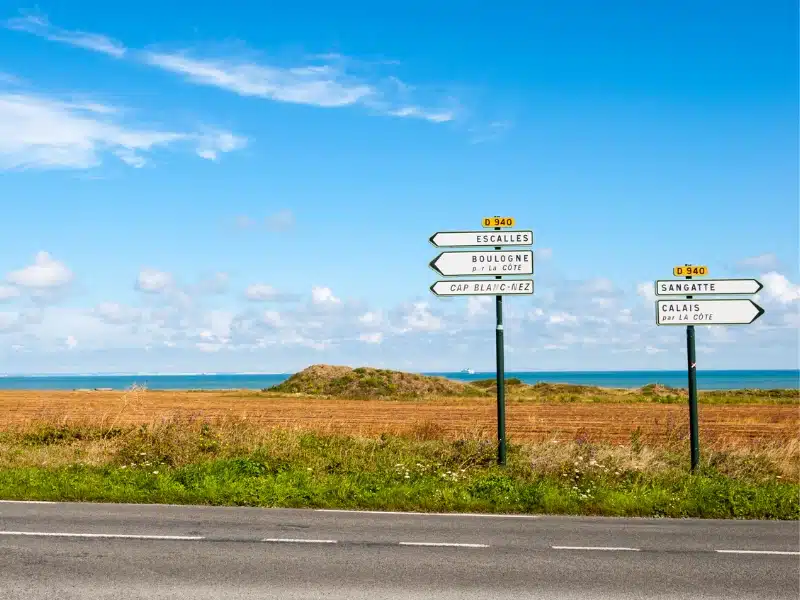
How are EU passport holders affected?
If you are an EU passport holder or a dual citizen of the UK and an EU country, you’ll still enjoy unrestricted travel within the Schengen.
That means no limits as to how long you can travel in the Schengen, although you must remember that most EU countries (not all of which are Schengen countries) restrict most visitors to 90 days before they must apply for residency.
This is not the same as the Schengen 90-day restriction, which covers all the Schengen countries as a single group, but is specific to the country and does not work on a rolling basis. For example, you can spend 90 days in Spain then pop over to Portugal for a day and come back to Spain for a further 90 days.
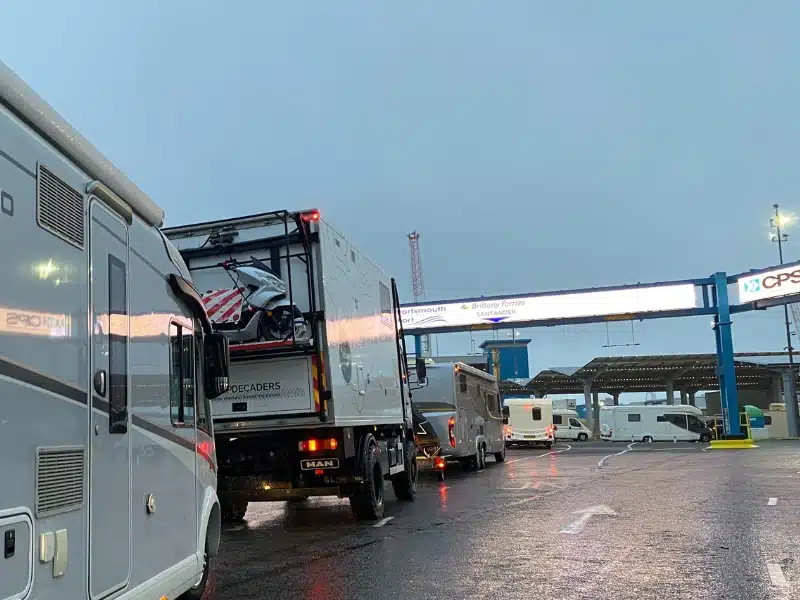
How does this affect a UK citizen married to an EU citizen?
If you are the UK spouse (or other family member as defined in Article 2 of the directive) of an Irish citizen or any other EU country, you are entitled to travel with your spouse or registered partner under Directive 2004/38/EC of the European Parliament and of the Council on the right of citizens of the Union and their family members to move and reside freely within the territory of the Member States
I am a UK citizen and Phil is both a UK and an Irish citizen as he was born on the island of Ireland. Back in February 2020, I heard about this little-known directive and asked the Europe Direct Contact Centre (EDCC) to clarify our position. This is a transcript of our emails;
Me: I am a British citizen, married to an Irish citizen. The Directive 2004/38/EC seems to say that as a spouse I have the same rights to freedom of movement as my husband in the EU. Please can you confirm the position regarding this directive? If it does not mean that I have the same rights as my husband regarding freedom of movement, can you confirm what freedom of movement rights I do have as the spouse of a citizen of an EU member state?
EDCC: Thank you for contacting the Europe Direct Contact Centre. To enable our service to assist you, please provide us with the following information:
- Do you plan to move or simply travel to the EU? Please provide the specific countries that you wish to travel to.
- When would you move?
- If you will be travelling together or not when you do?
Me: You asked me to confirm the following:
- Do you plan to move or simply travel to the EU? Please provide the specific countries that you wish to travel to. We do not plan to move to the EU. We currently travel extensively in a motorhome, visiting all the EU countries but never for longer than 90 days in each, and want to continue this way of life after Brexit.
- When would you move? We do not plan to move to the EU.
- If you will be travelling together or not when you do. We will be travelling together.
EDCC: Regarding your Irish husband’s own travel, as he is still a European Union (EU) citizen he can still travel and move freely to the EU. If he stays more than 3 months in an EU country, he might however have to register there.
If you travel with your Irish husband, the conditions under which you (as his British wife who wants to accompany him) can travel for a long stay in the Schengen area, staying no longer than 3 consecutive months in any given Schengen Member State, would need to be looked at in accordance with Article 6(2) of Directive 2004/38.
According to Article 6(2) of Directive 2004/38/EC non-EU national family members of mobile EU citizens have the right of residence in another Member State for a period of up to three months if they are in possession of a passport and are accompanying or joining an EU citizen, without any limitation to 90 days in a 180-day period.
Therefore the Directorate-General for Justice and Consumers considers that Schengen Member States may not refuse entry to its territory to the non-EU national family member accompanying an EU citizen because he has already been in the Schengen area for 3 months and has not left the Schengen area for another 3 months.
My Interpretation as a Lay Person
The response of the EDCC confirmed to me that my interpretation of the legislation was correct. We have had some people contact us to say they were told at an airport that the rules only apply if you’re actually a resident of the EU country, however, the document clearly states ‘Union citizens’ (defined in the Oxford Dictionary as “a legally recognized subject or national of a state or commonwealth, either native or naturalized“) and that is also what the EDCC advise.
Other Evidence
The European Commission Practical Handbook for Border Guards, which bizarrely is available online, states the following on page 20:
In the case of third-country nationals who are family members of EU, EEA and CH citizens, they have the right of residence in a Member State for a period of up to three months if they are in possession of a valid passport and are accompanying or joining the EU, EEA or CH citizen, without any limitation to 90 days in a 180-day period.
To be noted that third-country nationals who are family members of EU, EEA and CH citizens are entitled to accompany or join the EU, EEA or CH citizen for consecutive periods of up to three months per Schengen State without any conditions or formalities (except the need to have a visa for third-country nationals from a country subject to a visa requirement (of which the UK is not) where the person is not in possession of a valid residence card or a residence permit).
Our lived experience suggests that the law does indeed allow unrestricted travel for the spouse of an EU citizen is our experience of travelling full-time in the Schengen since 1st January 2021 when the transition period ended. I have ‘overstayed’ in the Schengen and entered/exited the land and sea borders of Spain, France, the Netherlands, Greece, Hungary, Bulgaria and Croatia without incident.
RELATED POST: Europe by Motorhome: The Best & Only Touring Guide You Need!
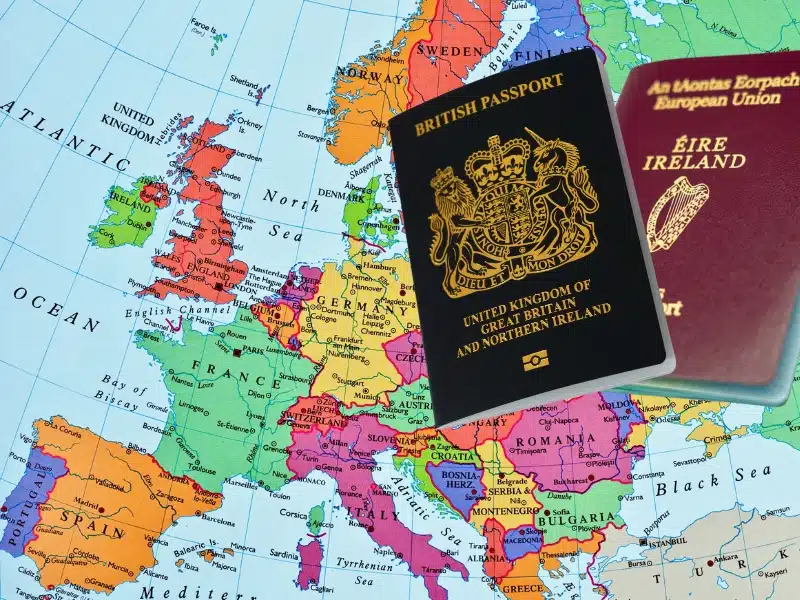
What if the UK spouse needs to travel alone?
As I was conversing with the EDCC, I realised there might be a time when I need to get home quickly. This is my discussion with them about travelling without my EU citizen husband:
Me: Many thanks for your responses regarding my queries regarding Article 6(2) of Directive 2004/38/EC. Please can you clarify a further point?
As a UK citizen, there may be times when I need to travel alone (eg back to the UK in an emergency). On re-entering the Schengen area to rejoin my Irish husband (having spent less than 90 days in the UK) could I be challenged as to the legitimacy of my previous stay in the Schengen, which may exceed the 90 days allowed for non-EU citizens?
I understand that I can travel independently visa-free in the Schengen area for up to 90 days, but that is assuming I have spent the previous 90 days outside of the Schengen area.
How can I evidence to border control that I have been in the Schengen under Article 6(2) of Directive 2004/38/EC conditions? I am worried that I may be denied entry if the above scenario were ever to happen.
EDCC: As previously stated, the Free Movement Directive applies not only to EU citizens who move to or reside in a host Member State but also to their family members. You will thus derive a right of entry and residence from your husband when accompanying or joining him in the territories of EU Member States of which he is not a national.
Regulation (EU) 2018/1806 has been amended to exempt UK nationals intending to visit the EU from the visa requirement for stays of no more than 90 days in any 180-day period. This amendment will enter into force on the day after the end of the transition period. This means that you will be able to travel visa free in your own right for a maximum of 90 days in any 180-day period in the EU.
It also means that you will be exempted from the entry visa requirement when accompanying or joining your husband to visit the EU, without any limitation to 90 days in a 180-day period (Article 6(2) of the Free Movement Directive).
When you are travelling alone from the UK to the EU with the purpose to join your husband, you would derive your right to entry from your husband, as non-EU national spouse of an EU mobile citizen. You will not have to wait 90 days before re-entering the EU, after already having spent there 90 days.
In order to verify whether you have a derived right of entry and residence, the host Member State may only require you to present a valid passport, a proof of family ties with him (i.e. your marriage certificate) and proof that you, as the non-EU national spouse of a mobile EU citizen, are (or will be) joining your EU citizen husband who is exercising free movement rights in a host Member State.
Please be aware, however, that in this case, you might need to have documentation to show when you were travelling together and when you were not.
My Interpretation as a Lay Person
It is clear that you have the right to travel alone and that prior travel in the Schengen zone won’t affect your right to 90 days as a solo traveller. But how you evidence travel with your EU spouse is less clear. I would be slightly anxious about going it alone and when and if that happens, I will update this post.
We do video and photograph our travels daily and also post much of this on social media, so maybe that’s evidence? We’d love to hear from anyone who has done this successfully and how you evidenced your travel as a spouse of an EU citizen.
There is another point to note regarding travelling solo. I have read on several Facebook groups about spouses who are insistent that you don’t let the border guard stamp your passport when travelling with your EU spouse as this somehow implicates you as being an overstayer. This is not correct.
Article 5, point 3 of the directive states: The host Member State shall not place an entry or exit stamp in the passport of family members who are not nationals of a Member State provided that they present the residence card provided for in Article 10.
As neither an EU citizen nor a resident, you still need to have your passport stamped so there is a record of your movements. Border forces know this and will not penalise you.
Other Evidence
The European Commission Practical Handbook for Border Guards states the following on page 20:
When the family member travels on his/her own and does not hold a valid residence card or a residence permit (see point 2.8 of this Section), the normal regime concerning the length of the short stay will (re)start to apply, as the conditions for benefiting from the facilitations concerning the free movement of the EU, EEA and CH citizens and their families are not met anymore.
The previous stays performed in the area without internal border controls accompanying or joining the EU, EEA or CH citizen should not be taken into account for the sake of the calculation of compliance with the 90/180-day rule which is applicable to the short stay only.

How does it affect my vehicle if I’m travelling long-term?
We also spoke to the EDCC about this, because we were concerned about being in the EU for more than 6 months with our UK-registered overland truck:
Phil: I am a dual UK/Irish citizen, residing in the UK. I have a motorhome which is UK registered and regularly travel to Europe. As an Irish citizen, I intend spending at least nine months of the year in the EU, no longer than three months in any country. Is there a limit as to how long I can keep my UK-registered motorhome in the EU? If it is time-limited, what actions would I have to take to re-set that time limit? i.e. If the limit is six months, can I spend one day in a non-EU country and then return to the EU restart the clock?
EDCC: The harmonisation of Union law in the area of car taxation is far from being complete. The relevant piece of Union law would normally be the Council Directive of 28 March 1983 on tax exemptions within the Community for certain means of transport temporarily imported into one Member State from another.
However, since the end of the Brexit transition period, that Directive is no longer applicable when it comes to UK-registered cars used on the territory of EU Member States (the same applies even if the motor vehicle is registered in Northern Ireland).
The situation you have described falls no longer under Union law and EU Member States are free to apply, in principle, their own national rules governing the conditions for the registration of motor vehicles originating in third countries. Therefore, we advise you to contact directly the national authorities of the Member State(s) where you intend to stay for a longer period of time with your motorhome.
My Interpretation as a Lay Person
This is less clear. However, on the basis that you won’t (or shouldn’t be) spending more than 3 months in any single Schengen country, you won’t be breaking any laws. Most EU countries allow you to drive a vehicle registered in your home country for up to 6 months, at which point you have to import the vehicle and swap your driving licence. But, it’s worth checking in individual countries if you’re concerned about this.
We were also a bit worried about the truck being registered in the UK in Phil’s name as he always travels on his Irish passport. We have crossed many EU borders plus Morocco, Turkey, Georgia and Armenia and this has not been raised as an issue once, so we’re assuming they don’t mind!
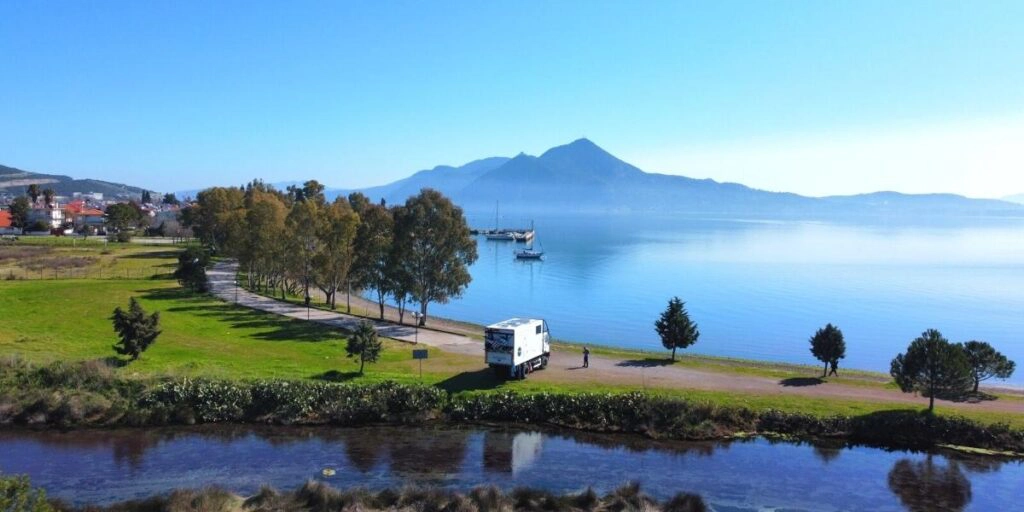
Will I need ETIAS if I am a UK spouse travelling with an EU citizen?
The official ETIAS website states the following:
Applicants with family-member status do not have to pay the EUR 7 application fee. Their application will also not be checked against screening rules on illegal immigration.
These exemptions apply to you if you meet the following conditions:
1. You are a family member of a European Union citizen and Directive 2004/38/EC applies to you, or a family member of a national of Iceland, Liechtenstein, Norway, or Switzerland who enjoys the right of free movement equivalent to that of EU citizens. Important: This only concerns family members of citizens of the forementioned countries (visa-exempt countries of which the UK is one) travelling to or residing in a country other than that of their nationality;
2. you are not required to hold a visa;
3. you do not hold an EU residence card or residence permit.
You must meet all these conditions to be eligible for an ETIAS travel authorisation with the family member status.
My Interpretation as a Lay Person
You still need to apply for ETIAS but whether you do that as a family member isn’t clear. I wrote to the EDCC to ask for clarification and below is our email exchange.
My question: I am a UK spouse of an Irish passport holder. My spouse is not a resident of Ireland but the UK, as he is also a UK national. If we wish to travel into the Schengen together, with France or Spain as our first country to visit (followed by many others) do I apply for ETIAS as a family member or without declaring family member status?
EDCC: You are required to carry an ETIAS when you travel to the EU. If you are travelling with your spouse or to meet your spouse, you should apply as a family member and the EUR 7 application fee will be waived. If you are travelling alone using your 90 in 180 day allowance, you will need to re-apply as a non-family member and pay the EUR 7 application fee.
Tips for Hassle-Free Border Crossings
If you are travelling as an EU passport holder with a UK spouse, or vice versa, we’d be glad to hear from you about any challenges or successes you’ve had. We find it very frustrating to read vast amounts of incorrect information on Facebook and other social media and would love to have a body of lived experience to provide sceptical people that using Directive 2004/38/EC to travel without restrictions will work.
Looking for more European travel inspiration? Check out these top posts…
Edinburgh in Autumn: Weather, Where to Go & What to Pack
London in Autumn: Weather, Where to Go & What to Pack
Scottish Highlands: 15 Most Gorgeous Places to Visit
Scotland in Autumn: Ultimate Travel Guide
Autumn in the UK: 27 Stunning Places
Paris in the Fall: Ultimate Travel Guide
Love it? Pin it!
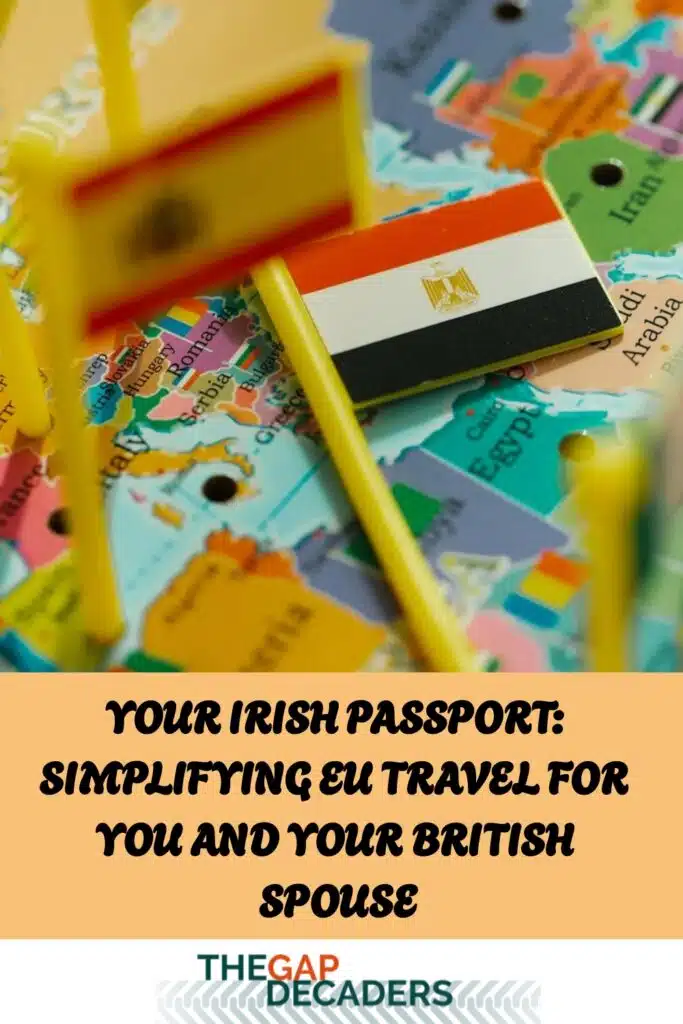
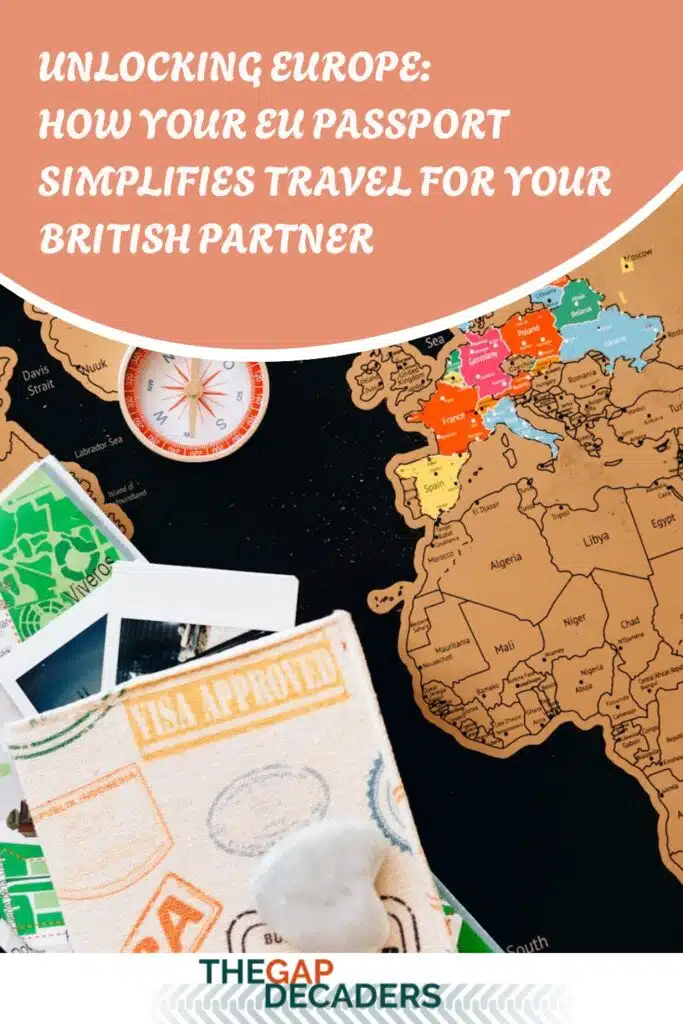







Thanks, glad you found it helpful 🙂
Top banana, thanks so much for the translation into plain English.
Thanks Dave glad to know it helped 🙂
Great article… at last something written in plain English
Answered all our questions and a few we didn’t know we had
thanks Izzy x